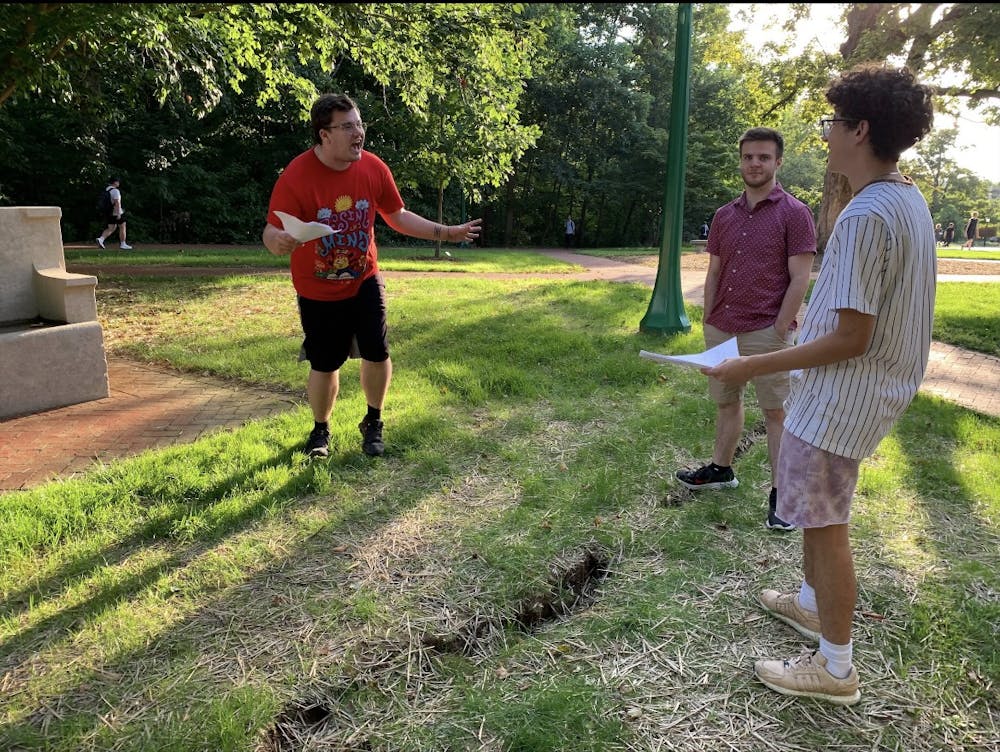David Hosei said he’d never written a play before — let alone produced one.
Hosei is a sophomore at IU, majoring in arts management, and took Intro to Playwriting this semester to enhance his acting ability. Since he was assigned to write a play that takes place on a bench, Hosei said the project forced him to exercise his creativity.
Because he’s not typically a writer, when he was assigned to write and produce his very own play on the first day of classes, he admitted the project intimidated him at first.
“You can create a story with what you’re given, and it can be a great one,” Hosei said. “Take what you’re given and use it.”
Related: [29th annual Lotus World Music and Arts Festival to kick off Sept. 22]
IU Theatre will premiere its first Micro Theatre Festival — an immersive debut of 24 new plays by 24 undergraduate Intro to Playwriting students — at 2:00 p.m. on Saturday in Maxwell Hall.
During the free event, visitors are invited to watch various short plays performed throughout the building, each written by an IU playwriting student. Each of the plays was written to fit the space they’re performed in: a staircase, a courtyard, a cubicle and several other sites.
Micro Theatre is a modern, experimental performance technique, which originated in Madrid, Spain in 2009 during the Spanish financial crisis.
As businesses began to fail and community spaces were vacated, a local theater company, Microteatro por Dinero, began a creative venture to enrich the city's artistic culture. The group began to organize short, venue-specific plays in abandoned locations. Their first project was a series of plays about sex workers hosted throughout an abandoned brothel.
Today, Microteatro por Dinero is a major, cutting-edge theater company and a source of inspiration, said Aline Araujo, one of the festival’s producers and IU Spanish and Portuguese Associate Instructor.
She’s excited to bring these kinds of performances to Bloomington audiences. Not only will student playwrights get to see crowds’ reactions, but visitors can watch the actors up close, Arajuo said.
“I am hoping that I'll be able to talk to the audience and see what they think because it is kind of unique,” Araujo said. “You don't get to experience that a lot, immersive performances, unless you're in a big city or something. I'm excited to see how people react.”
David Davila, Intro to Playwriting instructor and Master of Fine Arts playwriting fellow, said he thought the Micro Theatre Festival would be a perfect educational opportunity. He and his colleague, playwriting instructor Annalise Cain, wanted each student to see their play performed multiple times throughout the event. Since they’re performed simultaneously, each play will be repeated at least three times.
“(Students) came into school the first day of playwriting, and we’re like ‘Suprise! You're going to be a produced playwright within one month,” Davila said while laughing.
He said he’s looking forward to seeing the intimate interactions students will have with their audiences. Crowds’ reactions shift throughout the night and change the energy of an act. Davila also said he’s especially excited for the few audience members who will get to watch a solo performance in a tiny bathroom. Because there’s limited space, only a few individuals can see the show at a time.
“If you're lucky enough to be one of those people, that's very cool,” Davila said. “Because you'll see something that no one else will ever see.”
Related: [First Thursdays festival returns, welcomes IU students to explore the arts and humanities]
For Davila, it’s exciting that the Micro Theatre Festival can bring Latinx theater techniques into the Midwestern mainstream. He said he hopes student artists will be encouraged to tell their stories no matter what.
“What I really hope students take from this is the idea that there's nothing stopping them from creating theater at anytime, anywhere,” Davila said. “We don’t always have the money to produce big art, but if you have a place, if you have people, you can create art out of anything.”




